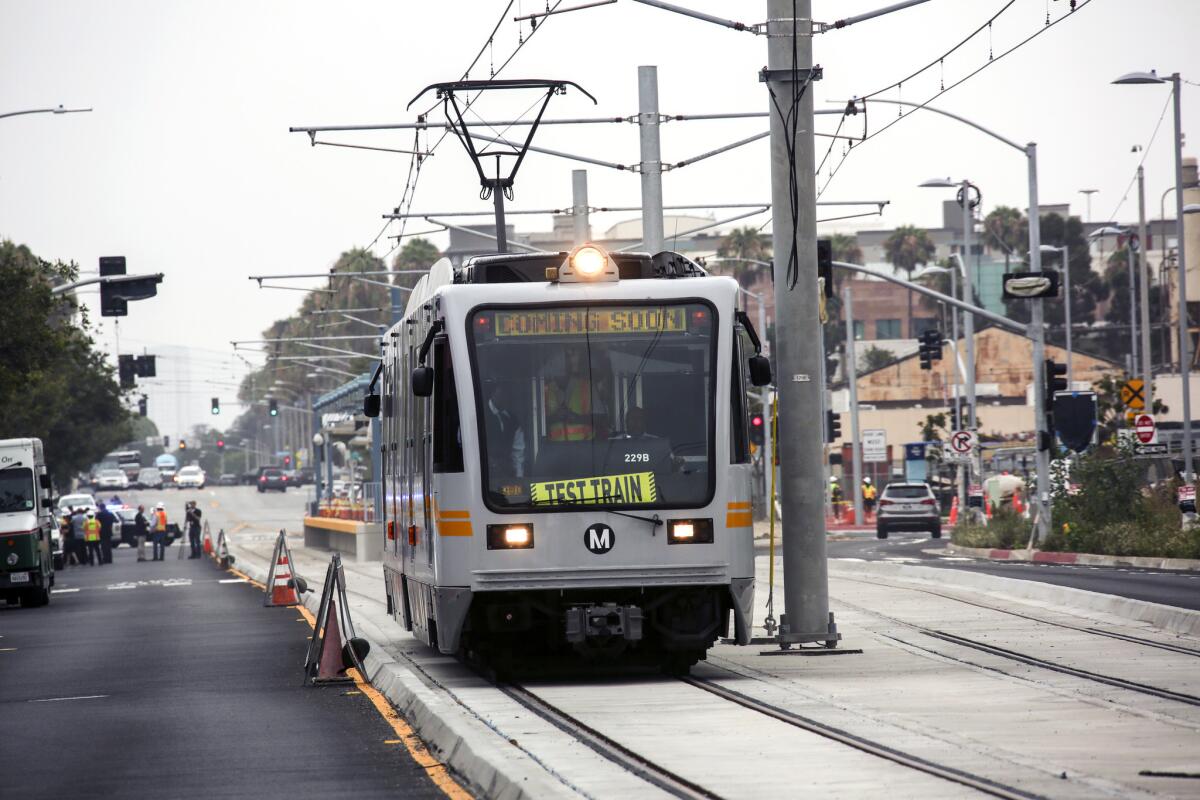Metro Expo Line to begin service to Santa Monica on May 20

Metro’s Expo Line will begin service to Santa Monica on May 20, officials said Thursday. Above, a test train moves along the line in Santa Monica last summer.
- Share via
After a six-decade hiatus, passenger rail service will return to the traffic-choked Westside in May.
The $1.5-billion, 6.6-mile extension of the Expo Line will begin running to Santa Monica on May 20, marking the first time that passenger trains have traveled between downtown Los Angeles and the Pacific Ocean since the demise of Los Angeles County’s extensive streetcar network in the 1950s.
The Metropolitan Transportation Authority sees the Expo Line, which will run through some of the Southland’s most congested areas, as key to its goal to draw Angelenos out of their cars and onto public transportation. The light-rail line will connect the Pacific Ocean and the employment centers west of the 405 Freeway to L.A.’s steadily expanding mass transit network.
The extension, primarily built on an abandoned Southern Pacific right-of-way, curves through Palms, Sawtelle and West Los Angeles, a route roughly parallel to the 10 Freeway. Its terminus, at Fourth Street and Colorado Avenue in Santa Monica, is a block from the Third Street Promenade and a half-mile from the ocean.
“It gives folks an opportunity to get out of the soul-sucking gridlock that is endemic in the Westside,” said Mike Bonin, a Metro board member and Los Angeles City Councilman who represents the Westside. “Folks are hungry for that option.”
The 15-mile ride from Santa Monica to downtown Los Angeles will take about 46 minutes, which Metro officials say is a competitive alternative to morning and evening rush hours on the 10 Freeway. Trains will run every 12 minutes for most of the day.
See the most-read stories this hour >>
Metro officials say the full Expo Line will handle about 64,000 boardings on an average weekday by 2030. Currently, the first half of the line — from Culver City to downtown Los Angeles — sees about 30,000 boardings per day.
The extension will add seven stations to Metro’s growing rail network: Palms, Westwood/Rancho Park, Expo/Sepulveda, Expo/Bundy, 26th Street/Bergamot, 17th Street/Santa Monica College and Downtown Santa Monica.
The May 20 ribbon-cutting will be Metro’s second in three months. The first is an 11.5-mile extension of the Gold Line, which runs east from Pasadena through Arcadia, Monrovia, Duarte and Irwindale, ending near Azusa Pacific University.
Once the Gold Line and Expo Line extensions begin service, Metro will operate more than 100 miles of light-rail and subway lines.
Both projects were largely funded through Measure R, the half-cent sales tax hike that the Los Angeles County electorate approved in 2008. Three other Measure R-funded rail projects are underway, through South Los Angeles, downtown Los Angeles and the Wilshire Corridor.
Four of the Expo Line’s seven new stations will not have parking for riders, and some residents and officials have voiced concerns that not being able to drive to the station will be a barrier to using the rail network.
Santa Monica officials say they are working to close the gap between the train stations and destinations or homes that aren’t within easy walking distance. City Manager Rick Cole said the city will encourage riders to walk, take Uber or Lyft, take the bus or use the city’s new bike-share system, designed for short, point-to-point trips.
Metro, Culver City and Santa Monica’s Big Blue Bus are reconfiguring routes to better connect to the stations, he said.
“It used to be you had two choices, the car or the bus,” Cole said. “Now we’re jumping on all the manifold choices that Angelenos have, and that’s going to change the way that people think about trips.”
Bonin said he hopes to encourage developers who want to build near Expo Line stations, such as the Expo/Bundy station, which is in his council district, to include parking exclusively for Metro commuters.
He added he hopes Metro will also gather data from its planned partnership with Lyft on trips that start and end at the Expo/Bundy station. That could show transit planners when and where Metro patrons are choosing to hail a ride, rather than walk, bike or catch another bus.
“Folks I talk to on the Westside use Uber and Lyft all the time, and that’s not a behavior change for them,” Bonin said. “But for a lot of folks, using the bus is.” Still, Bonin said, his constituents are eager to ride the trains, which, eventually, will help them become more open to using the rest of the Metro system.
For more transportation news, follow @laura_nelson on Twitter.
NEWSLETTER: Get essential California headlines delivered daily >>
ALSO
L.A. councilman blocks DWP move even as he advocates less political meddling at utility
Huntington Park looks to bring shoppers back to Pacific Boulevard
California cuts water use 17.1% in January, falling short of target
More to Read
Sign up for Essential California
The most important California stories and recommendations in your inbox every morning.
You may occasionally receive promotional content from the Los Angeles Times.










